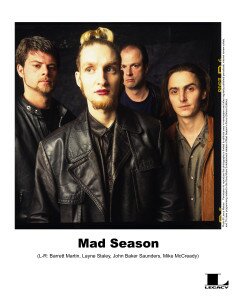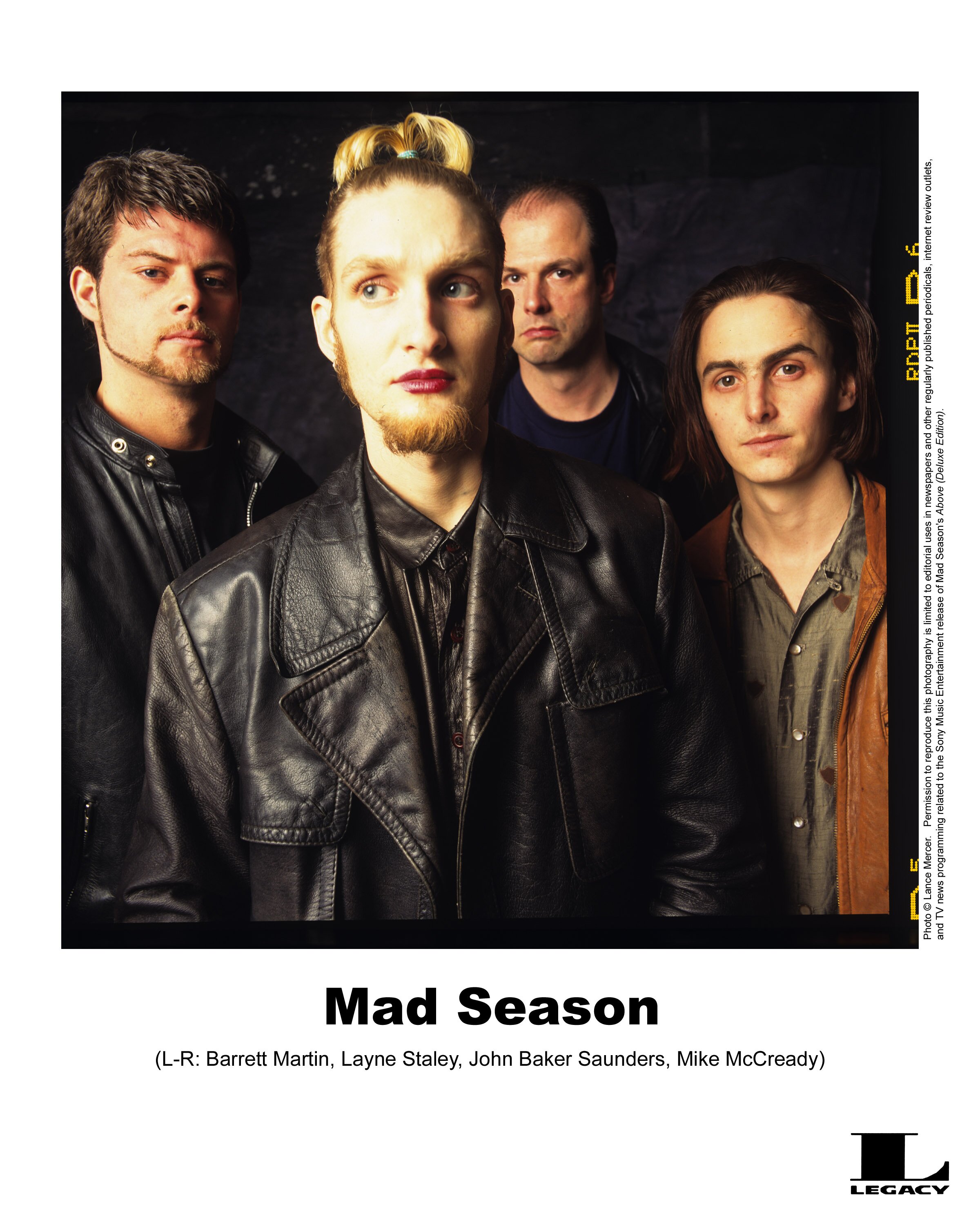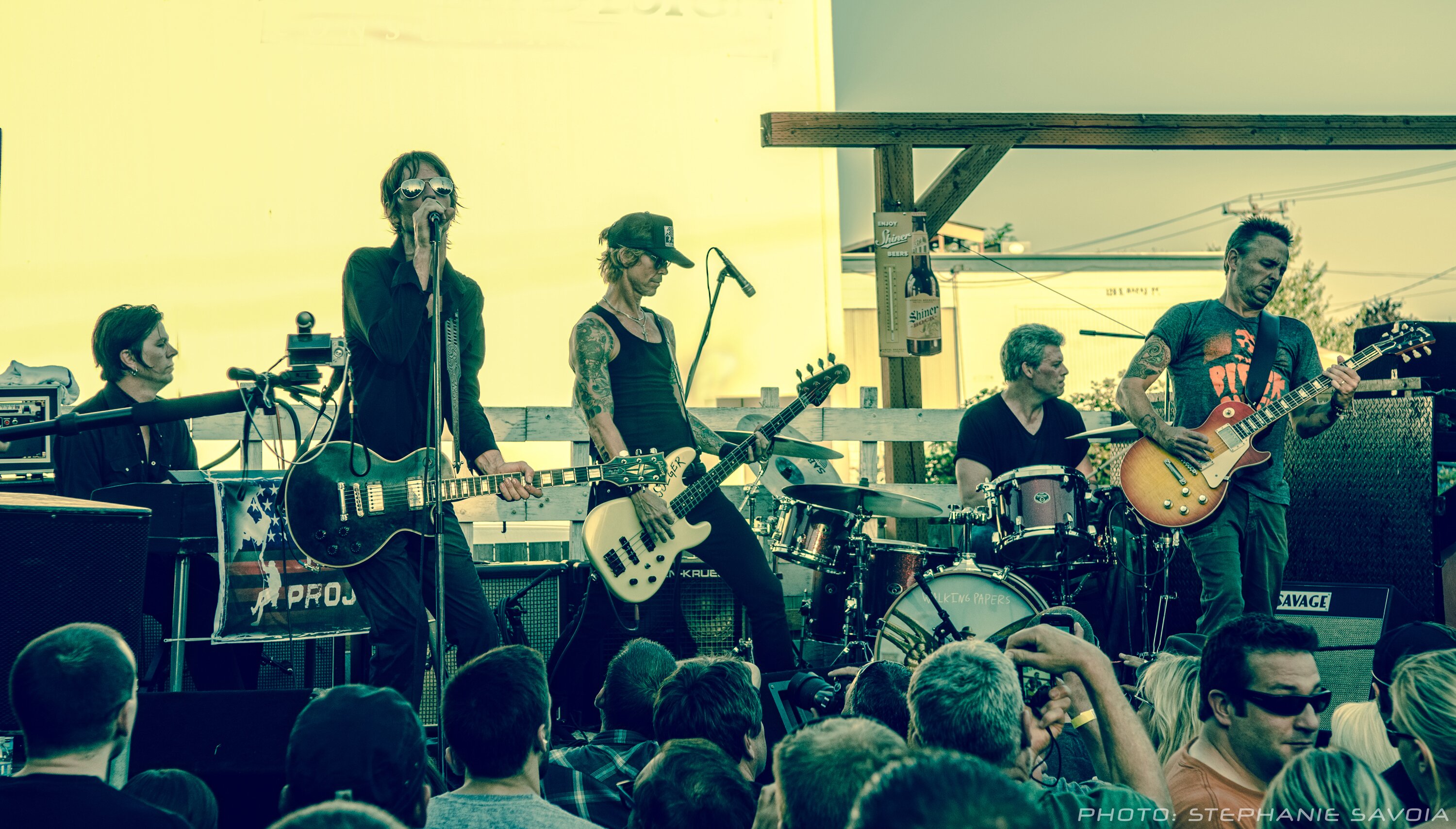http://vimeo.com/60586756
The recent stories suggesting that Pearl Jam guitarist Mike McCready, Screaming Trees drummer Barrett Martin, and Guns N’ Roses bassist Duff McKagan are rekindling former Seattle supergroup Mad Season? Sorry, false. “It’s not another Mad Season,” Martin told me last week. “We’re not trying to restart [the band].” But the trio has formed a band and is making new music, thanks to the bond Martin and McCready formed in that short-lived mid-’90s act.
Mad Season is making news itself, thanks to an April 2 reissue of its sole release, Above. The new edition is a product of serendipity and just enough distance from the passing of its other founding members, John Baker Saunders (1999) and Layne Staley (2002). As Martin told it, “Mike was at the Pearl Jam warehouse and [found] some tapes from our live shows. Around the same time, I found the rough mixes—just drums, bass, and guitar—for what would have been the second album, Disinformation.” The musicians liked what they heard, and to “honor their fallen brothers,” decided to “do a reissue and do it right.”
 That meant no garbled demos, no gimmicks, and the return of producer Bret Eliason. The Above reissue is the complete original album, five polished bonus tracks, their now-legendary April 29, 1995, Moore Theatre performance—on DVD and CD—and more. Three of the added songs were culled from the rediscovered mixes, completed by the other iconic vocalist who sang on the original: Mark Lanegan.
That meant no garbled demos, no gimmicks, and the return of producer Bret Eliason. The Above reissue is the complete original album, five polished bonus tracks, their now-legendary April 29, 1995, Moore Theatre performance—on DVD and CD—and more. Three of the added songs were culled from the rediscovered mixes, completed by the other iconic vocalist who sang on the original: Mark Lanegan.
Lanegan, who Martin said would have had a larger role in Disinformation, agreed to listen to the instrumental tracks and send back any thoughts they triggered. He surprised the others with completely ironed-out lyrics and vocals. “Mark wanted to do those three songs as a tribute to his friends. He said [they] represented the best of what the band was at that time, and I agree.”
And there’s no disconnect—the “new” songs sound like Mad Season. As Martin put it, “Atmospheric. Half light and delicate, half heavy.” “Locomotive” rumbles mightily along, driven by Martin and Saunders’ steely rhythm and a huge McCready finish. “Black Book Of Fear,” co-written by R.E.M.’s Peter Buck, takes it slower, recalling “Wake Up” and “Long Gone Day.” And “Slip Away” trots comfortably in between—then blazes out in an extended riff. If anything, the songs are indicative of where Disinformation was going. Martin believed “it was more focused, a little more heavy, with more focus on songwriting. I think the band was evolving.”
The first album’s title was an indication of the evolution that never came to pass. “We all felt like [it] should be called Above because it was about rising above darkness and bad things,” Martin explained, adding that the entire band was substance-free while recording. McCready and Saunders, who’d met in rehab, were fresh out. “I think part of making that record was us thinking, It’s kind of amazing what you can do when you’re sober and focused. We’d laugh a lot and had a good time together.”
But there’s no question that Staley, who wrote Above’s lyrics, was battling bad things. “He was definitely in mortal combat with the demons,” the drummer admitted. “But he had this ability to write about being in the darkness and seeing the light. I think that’s why ultimately the record has this uplifting, ascending quality. It doesn’t make you feel depressed. It makes you feel elevated.” Like proper blues, he explained. “The themes are ‘Oh, all these terrible things have happened to me. But you’ve been there, too, and that makes us all feel better.’”
Seeing Staley and Saunders on the Moore stage is bittersweet, though; both were perhaps at their career primes then, and things got bad soon after. “It becomes sad when you look back and think, I really wish Layne and Baker were here,” Martin said somberly. And then, brighter: “I bet Layne would be making some pretty adventurous music. He was really into a lot of different kinds, and was a very spiritual man. And Baker had this hilarious dry sense of humor. I just wonder what they’d say about the state of rock and roll in 2013.” His ironic tone and dry laugh indicated that his friends wouldn’t be impressed.
Until they heard what else Martin and McCready have been doing recently. Last year, the drummer formed Walking Papers, another blues-heavy rock act, with McKagan and The Missionary Position’s Jefferson Angell and Benjamin Anderson. A couple of guitar solos on the band’s self-titled debut are McCready’s; the axeman even joined them onstage. (Martin said the band’s already recorded two songs with the guitarist for its sophomore album, due early next year.) And with To the Glorious Lonely’s Jeff Rouse singing Staley’s lyrics, Walking Papers and McCready covered Mad Season’s “River of Deceit” live.
Plus there’s that new, non-Mad Season band with McKagan. Martin called the unnamed act a “house band.” “Duff and Mike and I wrote a bunch of songs last summer. We had this idea to be a backup band, with different singers. Like [with] Motown and Stax Records.” So they brought in Jaz Coleman from Killing Joke, and have designs on other vocalists. McCready’s new vinyl imprint, Hockeytalkter Records (his young son’s word for “helicopter”) will eventually release its tunes (as well as a wax edition of Above).
When the two aren’t working together, they’re still working. McCready’s primary band is assembling its tenth studio record. And Martin, also an adjunct Antioch University professor and indie label head, is finishing a book informed by his music studies with far-flung indigenous cultures.
“It’s called The Earth Is Singing,” he said. “It’s stories about my time in Africa, Cuba, Brazil, the Amazon, the Mississippi Delta—and there’s a chapter on Seattle. I guess it’s the perspective you take when you become a middle-aged rock-and-roller,” he laughed. “You start to look back on things with a bit of humor. You see things with a little more depth.”
All the better to craft classic blues.





